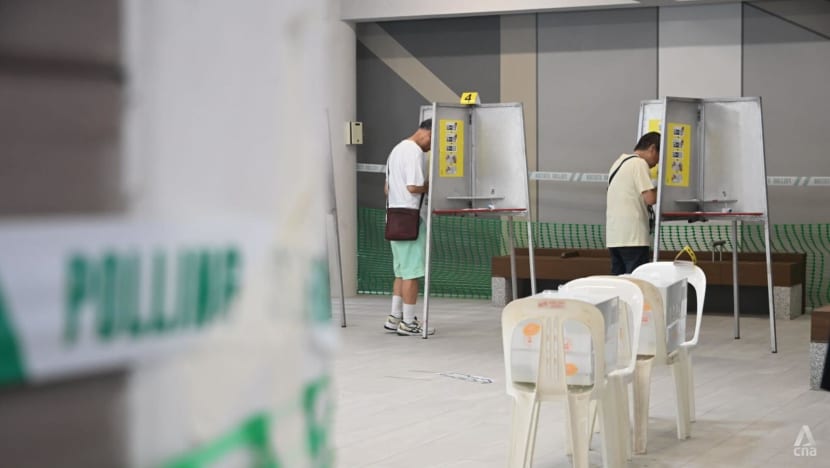Commentary: Podcasts didn’t decide GE2025, but they changed how Singaporeans engage with politics
The 2025 General Election may be remembered as the one where politicians spoke more freely and voters began listening differently, says Hong Kong Baptist University’s Kenneth Paul Tan.

Screengrab of Singapore Prime Minister Lawrence Wong (second from right) on the podcast Plan B. (YouTube/Lawrence Wong)

This audio is generated by an AI tool.
HONG KONG: When Prime Minister Lawrence Wong appeared on Plan B in December 2024, it marked a quiet turning point in Singapore’s political communication. In a free-flowing chat, he spoke about redefining success, minority inclusion, entrepreneurship and Singapore’s humanitarian stance on Palestine.
Weeks later, he joined The Daily Ketchup, reflecting on his journey into politics, how he became prime minister and his vision for Singapore’s future, peppered with questions about his MBTI personality type, diet and even secret ministerial chat groups. By April – just days before the 2025 General Election – he appeared on Yah Lah But to discuss leadership, public trust and why Singapore needs “radical change”, even from within.
Mr Wong’s appearances weren’t outliers. Politicians across the spectrum turned to long-form, conversational media to appear more relatable, candid and emotionally accessible.
The visibility of these engagements led many to call GE2025 Singapore’s first “podcast election”. But what did that really mean?

My father, now in his 80s and ever politically attuned, noted that this election was different. “There’s so much information now. YouTube, podcasts, all coming straight from the politicians,” he said. In earlier elections, most Singaporeans relied on the national media, WhatsApp messages, taxi drivers and coffee shop talk. That media landscape has certainly changed.
BLENDING ANALYSIS WITH ACCESSIBILITY
When I began researching political podcasts in 2024, the scene was still relatively small, outside of mainstream media. Established platforms like CNA’s Deep Dive were already exploring political and policy issues in audio formats.
But a handful of newer, independently produced channels – socialservice.sg, Teh Tarik with Walid and those mentioned earlier – were experimenting with a different tone and format: interviewing politicians across the spectrum, asking open-ended questions, and discussing politics in ways that felt both casual, less structured yet analytical. Since then, the ecosystem has expanded rapidly.
In the United States, podcasts often amplify partisan divides, offering ideologically tailored content that mobilises like-minded listeners. In Australia, although party leaders actively engaged podcasts and TikTok during the recent campaign, expectations of a “podcaster-led” election ultimately fell flat amid disengagement and geopolitical shocks.
Singapore’s politically engaged podcast scene is still young – especially compared to Australia’s more mature ecosystem – but already remarkably varied, with a mix of indie creators, academics, influencers and institutional media producing content that blends analysis with accessibility.
Platforms like Jo Teo’s TikTok account (@suchabohr) and the YouTube series Red Dot Perspective also shaped the GE2025 media environment. Jo, an Oxford graduate student, drew attention for her sharp data-driven critiques of electoral boundaries, including a widely shared rebuttal of a well-known commentator. Her work was later cited by a constitutional law professor in a public lecture hosted by AcademiaSG.
Red Dot Perspective delivered in-depth electoral analysis that often surpassed the anecdotal commentary of mainstream punditry. Though different in format from guest-driven podcasts, these channels reflect a growing appetite for accessible, evidence-based political discourse beyond party-aligned messaging.
THE INFLUENCE OF PODCASTS
Still, we should be cautious about overstating the electoral impact. Podcasts didn’t decide GE2025.
The People’s Action Party retained a clear mandate. The Workers’ Party held its ground but made no major breakthroughs. Smaller opposition parties – whose candidates also appeared on podcasts, often to great effect – did not win a single seat. Virality did not translate into votes.
Yet their influence should not be dismissed. Podcasts have changed how many Singaporeans engage with politics.
Unlike press statements or rallies, they offer politicians room to breathe, reflect and even be funny or vulnerable. This is no small feat in a system long associated with technocratic restraint and party discipline.
They also pose a unique challenge, especially to ruling party politicians used to carefully prepared messaging delivered with minimal scrutiny. On podcasts, they may not face hostile questions, but the challenge is subtler and arguably harder: maintaining clarity and composure in a relaxed, often humorous, self-deprecating environment.
Do too little, and you seem stiff. Try too hard, and you risk sounding artificial or condescending.
EVOLVING CULTURE OF POLITICAL SPEECH
Podcast listeners tend to be younger, more networked and more likely to share what they hear. Even if the direct audience is modest, secondary circulation through social media and private discussion can be significant.
This suggests a growing role for podcasts in future elections, alongside a growing need for clearer standards. As podcasts become more embedded in political communication, greater attention must be paid to transparency, especially around sponsored content.
This is particularly important in Singapore, where the lines between government messaging and partisan promotion are often blurred. If podcasts are to retain public trust, disclosures around affiliation and sponsorship should be standard practice.
Electoral politics in Singapore still depends on ground engagement, local trust and a party’s ability to deliver material benefits. Podcasts can support those efforts, but they can’t replace them.
Their value is cultural and atmospheric. In a society where political speech is often cautious, podcasts have created space for risk, laughter and – at their best – honest connection. That’s not electoral revolution, but it’s not nothing either.
GE2025 wasn’t decided by podcasts, but it may be remembered as the election where politicians spoke more freely, and voters began listening differently.
Kenneth Paul Tan is a professor of politics, film and cultural studies at Hong Kong Baptist University. His recent article Podcasting Politics in Singapore: Hegemony, Resistance and Digital Media was published in Critical Asian Studies.



















